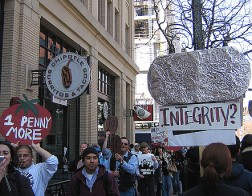Victory to the farmworkers! Coalition of Immokalee Workers announces that Subway has signed on to the penny-per-pound pass-through agreement

Fellow workers,
The Blockheads of the world may insist that unions survive only through violence, and win only through either the intervention of the State or vigilantism against non-unionized fellow workers. Yet somehow, today, I find this message from the Coalition of Immokalee Workers — and a similar e-mail from their allies in the Student/Farmworker Alliance — a southern Florida farmworker’s union that uses nonviolent protest, secondary boycotts, and other creative pressure campaigns on behalf of Florida tomato pickers, and which (because it is a farmworkers’ union) has no access at all to the government labor relations bureaucracy. Somehow, they have survived. Somehow, they have won — again.
From: Coalition of Immokalee Workers
Date: 11:29 AM
To: announce@lists.ciw-online.org
Subject: [CIW News] SUBWAY SIGNS!Subway, the third largest fast-food chain in the world and the biggest fast-food buyer of Florida tomatoes, reached an agreement this morning with the CIW to help improve wages and working conditions for the workers who pick their tomatoes!
Be sure to visit http://www.ciw-online.org for a photo of the signing and check back soon for more details about this exciting development in the Campaign for Fair Food.
If you are planning a protest as part of the Northeast tour, we ask you to stand down. The tour will still be hitting the road to visit Northeast with news of this newest victory and information on where the Campaign for Fair Food will head next. An updated schedule of events will be posted on the website soon.
Thanks,
The Coalition of Immokalee Workers
For those keeping track at home, here’s the timeline of C.I.W. victories in the penny-per-pound campaign:
April 2001: C.I.W. launches the
Boycott the Bell
campaign against Taco Bell, the first campaign to pressure a fast food restaurant into joining the penny-per-pound pass-through program to improve the piece rate for Florida tomato pickers.March 2005 — 4 years later: The C.I.W. announces victory in the Taco Bell campaign after four years of negotiations, boycotts, protests, and, finally, a hardball campaign to enlist sympathetic student groups to
Boot the Bell
by pressuring their colleges and high schools to cancel or call off food-service contracts with Taco Bell. Taco Bell now becomes the first fast food provider to voluntarily pass through money to increase farmworkers’ wages. The C.I.W. announces that it will now turn its attention to getting similar agreements from other large fast-food chains like McDonald’s and Burger King.April 2007 — 2 years after that: The C.I.W. announces victory with a penny-per-pound agreement from McDonald’s. It takes two years of negotiations and a low-intensity pressure campaign; just after the C.I.W. announces it is about to escalate with another Taco Bell-style boycott and
Truth Tour,
McDonald’s signs on for the agreement. The C.I.W. announces that it will organize its next campaign, focusing on Burger King.May 2008 — 1 year after that: The C.I.W. announces victory with a penny-per-pound agreement from Burger King after a year of negotiations, some very dirty dealing by Burger King (most of which came back to haunt them when it was exposed), public protests by the C.I.W. and its allies, and national press attention from journalists who supported the C.I.W. and opposed Burger King’s union busting tactics. 13 months after the C.I.W. began its Burger King campaign, Burger King announces that it will sign on for the penny-per-pound agreement. The C.I.W. announces that it will organize campaigns to get new agreements from fast-food restaurants and grocery stores like Whole Foods, Subway, and Chipotle, which sell themselves as healthy,
sustainable
businesses.September 2008 — 4 months after that: The C.I.W. announces victory with a penny-per-pound agreement from Whole Foods. The C.I.W. announces that it will turn its attention to escalating their campaigns to win similar agreements from Subway and Chipotle.
December 2008 — 3 months after that: After seven months of negotiations, and three months of a low-intensity pressure campaign (focusing on getting supporters to send postcards to Subway’s CEO), the C.I.W. announces plans to launch a multi-city protest
Truth Tour
in the northeast. Just before the tour begins, Subway agrees to sign on to the penny-per-pound agreement.
If the accelerating trend continues, we can expect the next C.I.W. victory to be announced some time around late January or February. (Except for Whole Foods being two months early, the time it takes for each new victory has consistently followed a geometric decay curve. That can’t last forever, but here’s hoping it holds for a while yet.) In any case, this is a big win, and it's hardly the end. The C.I.W. is still fighting to get an agreement from Chipotle, and is preparing to organize pressure campaigns for other supermarkets and food service outfits. There's a lot more yet to come.
Fellow workers, the C.I.W.’s ongoing series of inspiring victories for Florida farmworkers are both an inspiration and a reminder. We should never forget the power of creative extremism and wildcat unionism — a power that needs no government, no ballot boxes, no political bosses, no Officially Recognized labor bureaucrats, no lawyers, and no Changeling political parties. It’s the power that fellow worker Joe Ettor reminded us all of, as he and his fellow workers struggled to a hard-won victory in the great Bread and Roses
textile strike of 1912, when he said:
If the workers of the world want to win, all they have to do is recognize their own solidarity. They have nothing to do but fold their arms and the world will stop. The workers are more powerful with their hands in their pockets than all the property of the capitalists. As long as the workers keep their hands in their pockets, the capitalists cannot put theirs there. With passive resistance, with the workers absolutely refusing to move, lying absolutely silent, they are more powerful than all the weapons and instruments that the other side has for attack.
Yes, we can do it–ourselves. And we will.
¡La lucha sigue–victory to the farmworkers!
See also:
- GT 2008-09-10: ¡Sí se puede! Coalition of Immokalee Workers announces another victory in penny-per-pound agreement with Whole Foods
- GT 2008-09-08: Slavery in Florida’s tomato fields
- GT 2008-07-03: ¡Chipotle, escucha: estamos en la lucha!
- GT 2008-05-27: Even better than I thought: victory for the Coalition of Immokalee Workers against the Florida Tomato Growers Exchange, too
- GT 2008-05-23: ¡Sí se puede! Victory for the Coalition of Immokalee Workers in the Burger King penny-per-pound campaign
- GT 2007-12-06: Solidaridad
- GT 2007-11-30: Coalition of Immokalee Workers marches in Miami
- GT 2007-04-19: ¡Sí se puede! The CIW wins a groundbreaking wages and conditions agreement with McDonald's
- GT 2005-03-31: Anarquistas por La Causa
- GT 2005-03-23: ¡El pueblo unido jamás será vencido!
- GT 2001-08-30: ¡Sí se puede!



